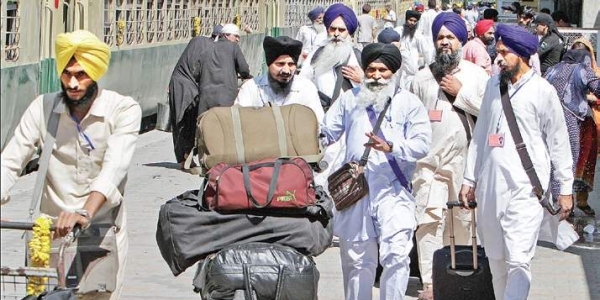LAHORE: On Tuesday, almost 2,000 Sikh pilgrims crossed into Pakistan through the Wagah border to celebrate Baisakhi, which will begin on Wednesday (today).
On Thursday (tomorrow), the Gurdwara Panja Sahib (Hasanabdal) will host the major celebration event, according to authorities.
Thousands of pilgrims, led by Sardar Arvinder Singh, crossed the Wagah-Attari border on foot from the Indian side to Pakistan around 11 a.m.
A hearty welcome awaited the pilgrims upon their arrival from the Evacuee Trust Property Board (ETPB) and other departments, under the direction of the ETPB Additional Secretary (Shrines), Rana Shahid.
Tomorrow’s main ceremony at Gurdwara Panja Sahib will be attended by pilgrims who thank Pakistan for making their journey possible.
Our gurus’ homeland of Pakistan always makes us joyful and calm. The party leader and Shiromani Gurdwara Parbandhak Committee (India) office bearer, Sardar Arvinder Singh, told reporters at the border that “we have come here with a lot of affection for the people of Pakistan.” He thanked Pakistan for giving visas to many pilgrims, allowing them to attend the Baisakhi holiday.
Indians and Pakistanis share the same cultural heritage, according to Sardar Sukhbeer Singh, the head of the Delhi Gurdwara Management Committee.
As he went on to say, “the accommodations made by the Pakistani government for us are outstanding.”
More than 2,200 pilgrims, including women, were granted visas by the Pakistani High Commission in New Delhi, according to an official source in the ETPB.
At 11 a.m., the pilgrims began their journey from India to Pakistan via Wagah. 2,044 had arrived in Pakistan by the afternoon (3 p.m.), an official informed.
Thereafter, “they were transported to Hasanabdal by special buses and trains, supervised by Railways Police and other local authorities,” said the official, who added that the group had also been fed.
An official with Pakistan Railways Police claimed that after initially being transported to the station from the border crossing at Wagah, the pilgrims were loaded onto three trains and transported there under the watchful eye of the Railway Police.
Because of security concerns, pilgrims on their way to Hasanabdal were not permitted to get off the trains. The speaker made it clear that they would not be permitted to get off the trains or other modes of transportation (bus, automobile, etc.) while in Pakistan throughout their journey.
This included free meals for those travelling from Wagah to Hasanabdal, he said.
“The female officers offered extra protection for female pilgrims.” At around 8 p.m., all pilgrims had arrived at Hasanabdal safely, the narrator reported.
According to him, 400 railway police officers had been assigned to the pilgrims’ safety as part of the security arrangement. Every railway station, particularly Wagah, Lahore, Hasanabdal, and Nankana Sahib, has been fortified with special commandos and snipers.
Sikh pilgrims are prohibited from interacting with the public or leaving their designated area of stay because of safety concerns, and it also prohibited them from bringing any combustible items onto the train. Also, in Wagah, a control centre has been set up to transmit real-time information on train movement. An official explained that the goal of a thorough strategy is to provide a secure and serene environment for Sikh pilgrims.
“Arrangements pertaining to cold water, clean washrooms and trains have been made accessible for the Sikh yatrees,” said ETPB’s Rana Shahid.
Pilgrims will also visit Nankana and other areas following their visit to Gurdwara Panja Sahib in Hasanabdal, he added.
Baisakhi, an ancient spring harvest celebration in India and Pakistan, should be mentioned. At the end of the 17th century, when Guru Gobind Singh determined the date of the celebration, it became firmly identified with Sikhism. Celebrations for the Sikhs include visits to their sacred locations.


